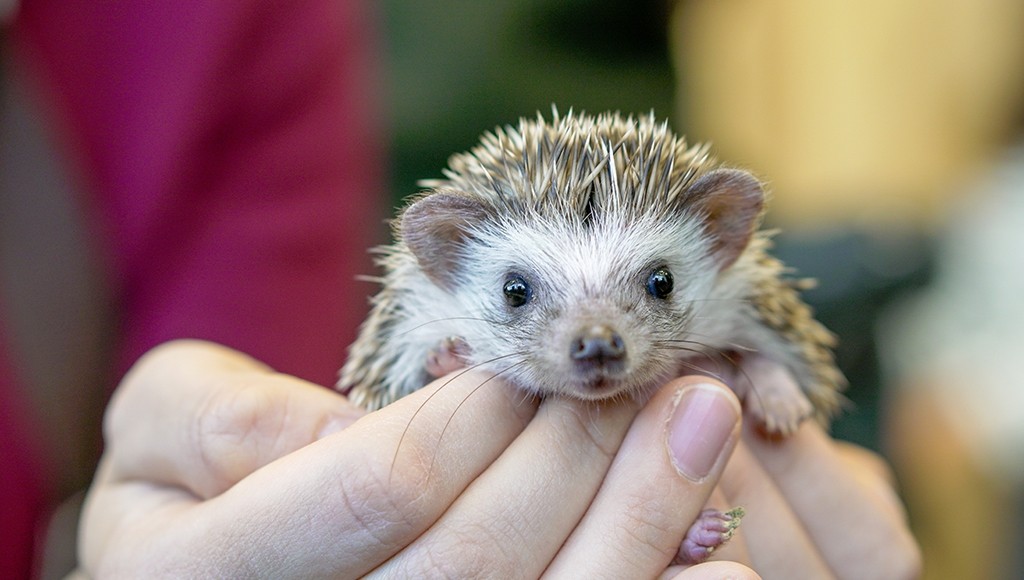Hedgehogs are increasing in popularity as exotic pets, and it’s no wonder. What’s not to love about these adorable, spiny balls of cuteness?
Their tendency to roll into a tight little ball when startled is a defensive measure which serves to protect them from predators in the wild.
However, it is an interesting phenomenon to watch and sure to intrigue your family.
About African Pygmy Hedgehogs
European (Erinaceus europaeus) and African pygmy (Atelerix albiventris) hedgehogs are the two most popular types of pet hedgehogs. Hedgehogs originate in Africa, Asia and Europe and are often imported to the U.S. by exotic pet dealers.

The African pygmy hedgehog is smaller than the European hedgehog. They weigh about 19 to 25 ounces and are usually around 5 to 8 inches long. European hedgehogs are around 9.5 inches long and weigh about 1.7 pounds. For our purposes here, we’ll discuss the African pygmy hedgehog, which is a trendy exotic pet.
They are nocturnal animals, which means you won’t be able to enjoy much playtime with them during the day because they will be sleeping. However, they will be wide awake and active during the evening, so you can enjoy some quality time with them then.
These are minimal maintenance pets. They are insectivores so feeding them is not difficult. They are content with daily freshwater and their favorite foods. Nail trims and regular checkups for parasites should keep them healthy in most cases. With proper care, your animal companion should live for about three to six years.
Getting Your African Pygmy Hedgehogs
If you’ve weighed all the pros and cons and decided a hedgehog is the right fit for your family, your next step is deciding how and where you will get your new friend.
While you can always buy one from a breeder, you might want to investigate other options as well.
Check out your local animal shelter. There could be a hedgehog there just waiting to find a forever home. Additionally, you could investigate the possibility of adopting one from an organization such as the International Hedgehog Association or the Hedgehog Welfare Society.
Many of these groups will have rescued animals that would make good pets and need a new home.
African Pygmy Hedgehogs Housing
Supplying a safe home for your pet hedgehog is not difficult or expensive. Plastic or wooden enclosures are preferable to wire caging, which could hurt their tiny feet.
If you decide on a plastic enclosure, make sure it is not made from any toxic, harmful materials. Here are a few other helpful tips:
- Do not put the housing in direct sunlight or in drafts
- Loud noises may startle your pet, so put their home in a quiet place
- Make sure the housing is in a well-ventilated area
- Hedgehogs are skilled escape artists so make sure the enclosure is escape-proof
- Clean the enclosure weekly – spot clean as needed
- Enclosures should give your pet at least four square feet of space
African Pygmy Hedgehogs Bedding Material
Choosing the right bedding material for your hedgehog is important. These tiny creatures love to burrow and hide, so you’ll need to choose the proper bedding to allow them to pursue these activities. Just make sure they don’t decide to consume their bedding, as they could choke.
Pelleted bedding or Aspen shavings are generally safe choices as are shredded paper or untreated shavings. However, you may want to ask your exotic pet veterinarian what type of bedding to choose.
Avoid these types of bedding as they may cause allergies, infections, or dermatitis:
- Terry cloth towels
- Corn-cob bedding
- Cedar or pine shavings
African Pygmy Hedgehogs Feeding and Diet
As mentioned earlier, hedgehogs in the wild are insectivores as well as opportunistic omnivores. They eat:
- Insects
- Spiders
- Worms
- Slugs
- Snails
- Eggs
- Fruit
Since captive hedgehogs are prone to obesity, the best diet choice for them is commercial pelleted hedgehog food supplemented by occasional treats such as:
- Earthworms
- Mealworms
- Eggs (scrambled or hard-boiled)
Avoid feeding them any dairy products and consult your vet to see if your pet will need any supplementary vitamins or minerals to stay healthy. Since they are nocturnal animals, offer them food at night. If there is any uneaten food in the morning, remove it from the cage.
African Pygmy Hedgehogs Zoonoses
Although they look cute and cuddly, and they can make good pets, there are some potential health hazards to consider before getting a hedgehog. Like many exotic animals, they can be carriers of zoonotic diseases such as foot-and-mouth diseases. These are infectious diseases and can be transmitted to humans.
Some of the most prevalent zoonotic diseases associated with hedgehogs are:
- Salmonella Tilene
- Mycobacteria
- Ringworm
Additionally, your prickly friend is susceptible to external or internal parasites (think fleas, worms, or ear mites). If you also own dogs, make sure they are vaccinated against kennel cough, which can be transmitted to your hedgehog and cause it to develop pneumonia.
You can reduce the risk of contracting a disease from your pet by following standard good hygiene practices such as washing your hands before and after handling your pet and avoiding contact with its feces.
It’s also a good idea to wash your hands after handling your pet’s toys. Clean and sanitize their cage or habitat area regularly.
Keep an eye on your pet’s overall appearance of health and take it to the vet if you notice any signs of illness or disease.
Loss of appetite, lethargy or abnormal behavior from a typically lively pet is warning signals that your pet needs to be checked out by a vet.
African Pygmy Hedgehogs Exercise and Enrichment
Hedgehogs in captivity may not get as much exercise as those living in the wild. They do have a propensity to obesity, so it’s a promising idea to provide them with toys that encourage exercise and enrichment. An effortless way to do this is by supplying them with toys adapted to their natural burrowing instincts.
Tunnels or tubes made of non-toxic plastic and hideaways that allow them to climb (without the danger of falls) are perfect choices. A ferret treat ball is a fun possibility that has benefits for both you and your pet.
Mazes are also fun and an excellent way to stimulate your pet’s intellect. Just be sure to design a maze that is big enough for your hedgehog to turn around in, so he doesn’t get stuck.
An exercise wheel made of solid, not wire, the material is also an appropriate choice. (Remember, the wire can hurt those teeny-tiny feet!) Soft, stuffed toys may be proper if they don’t include any parts that could be chewed off or swallowed (think bead eyes, loose parts, or stringy materials).
Legal Issues regarding African Pygmy Hedgehogs
The United States requires hedgehog dealers to have a United States Department of Agriculture (USDA) license to sell these spiny pets.
Before you buy one, it’s a good idea to check the local and state regulations for your area, as owning a hedgehog may or may not be legal for your locality. For instance, it is currently illegal to own hedgehogs in the following states:
- Arizona
- California
- Georgia
- Hawaii
- Maine
- Pennsylvania
- Vermont
- Washington D. C.
How to Pick up and Hold a Hedgehog?
The Final Word
African Pygmy Hedgehogs are adorable pets with the potential to be loving animal companions for anyone. They are especially suitable for the elderly, who may not be able or willing to care for a dog or cat. They are not suitable for young children except with strict supervision by an adult. The main risk for small children is being unintentionally hurt by the hedgehog’s spines.
Another nice perk of owning a hedgehog is they are acceptable as pets in certain situations where other pets are not. A good example of this is if you rent your home. While some landlords do not allow dogs or cats as a pet, because they are concerned about potential damage to their property, they might be willing to let you have a tiny pet companion like a hedgehog.
Overall, if your heart is set on getting an exotic pet, why not try an African Pygmy Hedgehogs? You’ll be sure to fall in love!

